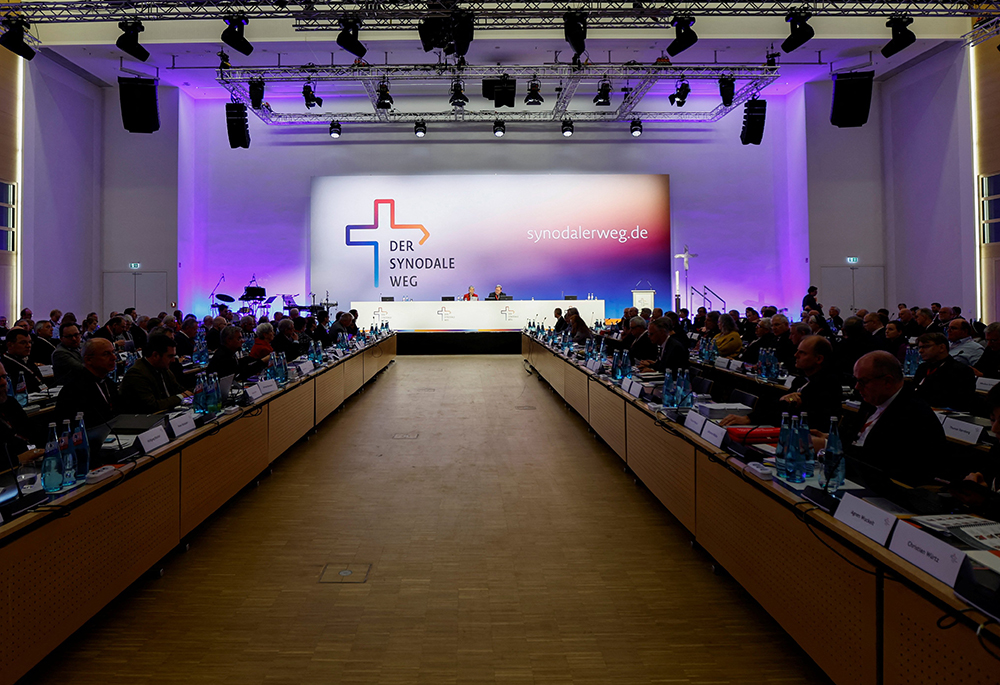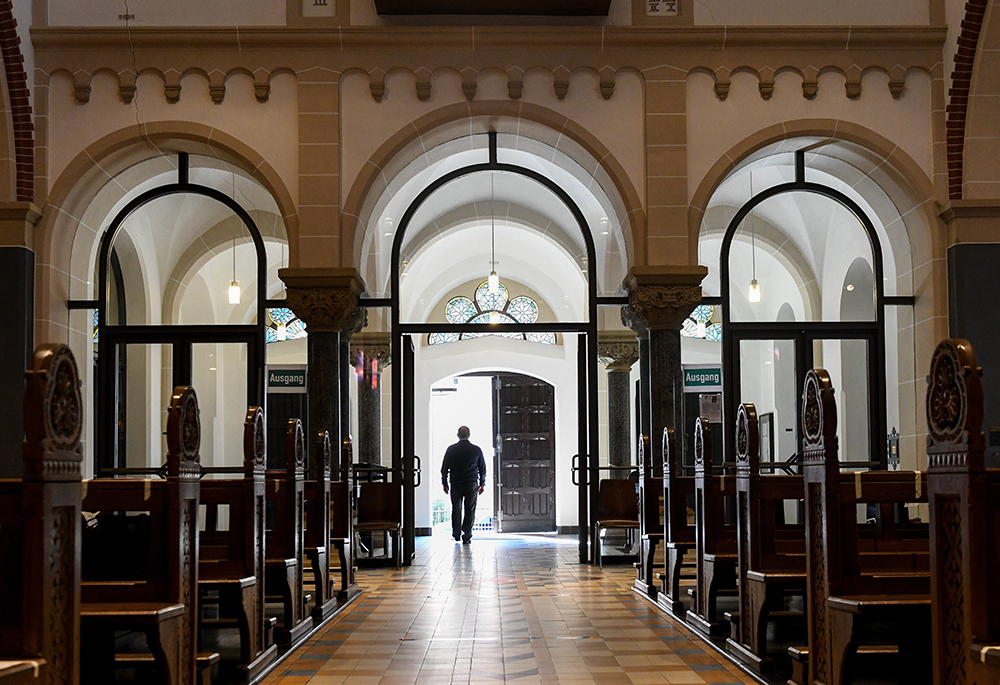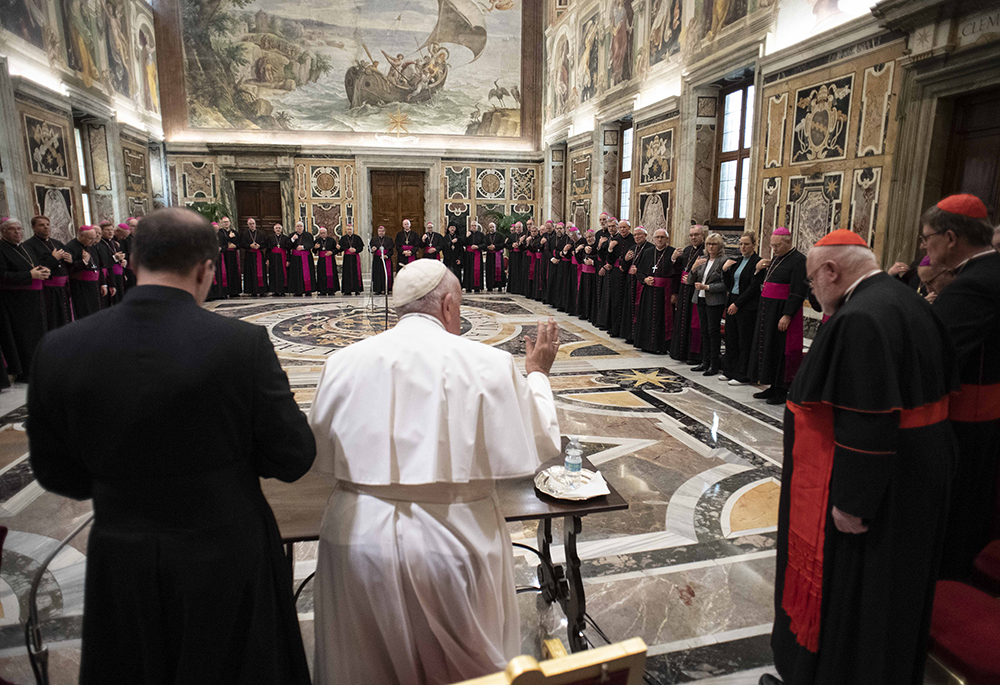
Irme Stetter-Karp, president of the Central Committee of German Catholics and co-chair of the Synodal Path, and Bishop Georg Bätzing, president of the German bishops' conference, attend the fifth synodal assembly March 9 in Frankfurt. The pope commented on the Synodal Path in a private letter dated Nov. 10, later published in German news outlet Die Welt. (OSV News/Reuters/Heiko Becker)
It's no secret that the German Catholic Church's reform project, known as the "Synodal Path," is a thorn in Pope Francis' side. He has criticized the process, which has brought forward ideas such as blessings for same-sex couples and the election of bishops, numerous times.
But his latest comments on the project came as a surprise for just about everyone, except for four conservative German Catholic women.
The comments came in a private letter by the pope, dated Nov. 10 and later published by the German news outlet Die Welt. It was addressed to Katharina Westerhorstmann, Marianne Schlosser, Hanna-Barbara Gerl-Falkovitz and Dorothea Schmidt — two theologians, a religious philosopher and a journalist. All of them are former members of the Synodal Path assemblies, who publicly announced their departure from the project last spring.
They wrote to Francis on Nov. 6, voicing their discomfort with the continuing reforms in Germany. Maybe even as a surprise to them, the pope replied only four days later with a personally signed letter. And it was written in German.
The sentiment of the one-page note probably wouldn't surprise anybody familiar with the recent tensions between Germany and the Vatican. Still, the reactions in Germany are mixed. They range from disappointment to sheer denial to even some conspiracy theories.
What did Francis say? He voiced his "deep concern" on the "continuing concrete steps" the church in Germany is taking towards a reform that "threatens to take the country on a path away from the universal Catholic church."

A man walks out of an empty church in Bonn, Germany in this file photo dated June 12, 2020. (OSV News/CNS/KNA/Harald Oppitz)
Even though Germany's three-year "Synodal Path" project concluded in March, the organizers now want to implement a new governing body for their church, a so-called "Synodal Council." It would involve a regular meeting of clerics and laypeople who are supposed to make decisions on the future for German Catholics.
But before the council's proposed launch in 2026 yet another different "Synodal Committee" is to take place, which would prepare for the implementation of the council. As always in Germany, the process is well thought out and a bit complicated.
Whether committee, council or meeting — the pope and the Vatican don't approve of the ongoing process. On the same day the pope's letter arrived in Germany, Nov. 10, the "Synodal Committee" met for the first time. In his letter, Francis refers to this committee by name, reminding Germans that the Vatican forbade this step in a letter from last January, which was personally approved by the pope. A new governing body including laypeople would break the sacramental structure of the church, the pope and the Vatican insist.
For people who know Francis for his own effort to reform the church, this might come as a bit of a surprise. In this new letter he writes that people should not look for "salvation" (in quotation marks) in new committees and councils, but through prayer, repentance and adoration.
How did Catholics in Germany react to this big red stop sign from the pope himself? The conservative minority felt justified. Reformers appear to be in denial. And some people even smell a conspiracy. Did Francis write this letter himself? Or might it even be a forgery? Some people on social media pointed out, that he signed the letter with a different signature than usual. He wrote the German "Franziskus" instead of the usual Latin "Franciscus." For some people, reason enough to speculate.
The German bishops' conference is responsible for the reform process, yet did not feel the need to react. The bishops were not addressed in the letter, so they don't feel obliged to respond, said conference spokesman Matthias Kopp.
The "Central Committee of German Catholics," which organizes the "Synodal Path" together with the bishops, however, did react. They pointed out that in their view the "Synodal Committee" does not break the church's Code of Canon Law, and so they don't see any reason to abort the project.

Pope Francis gives his blessing to the bishops of Germany during a meeting in the Clementine Hall of the Apostolic Palace Nov. 17, 2022, as part of the bishops' "ad limina" visits to the Vatican. (CNS/Vatican Media)
But what about the four women the letter was sent to? Were they actually concerned about the future of the German reform project? Maybe, but the publishing of this letter is most definitely a political move as well, trying to derail the reform process. All four are prominent figures, known for criticizing Germany's reform ideas.
Their original letter to the pope won't be made public, they said. "We asked if we could publish the reply and got a 'go ahead' from Rome," said Schmidt, one of the letter writers, to Catholic German outlet DomRadio.de. They feel strengthened by Francis' words, she said. "In my view our country now has two choices. Either we ignore the pope's words and keep denying the wishes of every cardinal, bishop and layperson in the world who disagrees. Or we follow the continuing warnings of even the pope and repent. We can't just bang our heads against the wall."
But is the German reform process really in peril from Rome? It doesn't seem so. And the letter itself is the best indication of this. Even though Francis and the Vatican harshly disagree with the German process, all they've done so far is send letters. To the German bishops, the faithful in Germany — and this time to four private citizens.
Advertisement
Every time the wording seems to get more direct. But real actions to stop the German process have not been taken. The Vatican seems to know that this would threaten a rupture in the worldwide church: progressives on one side, conservatives on the other.
The Vatican criticizes, but won't stop the reforms in Germany. On the contrary, for 2024 there are so far three meetings planned between German bishops and Vatican dicasteries to discuss the reform wishes of the German church.
In a latest reaction Vatican Secretary of State Cardinal Pietro Parolin said that subjects like women's ordination and homosexuality are off the table. Yet again they continue to talk and don't slam the door in the faces of the Germans. What's left is public disapproval. And a bit of an aftertaste for German reformers. Their bishops have to wait for months and years to discuss their reform wishes in Rome — yet the pope replied to conservative complainers within four days.








